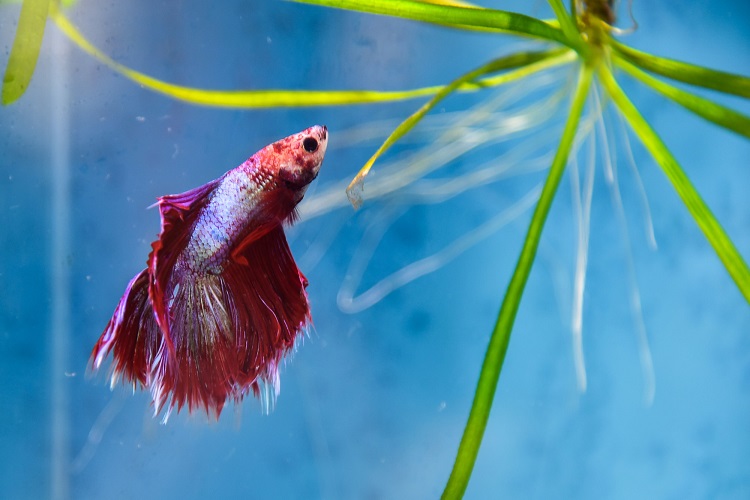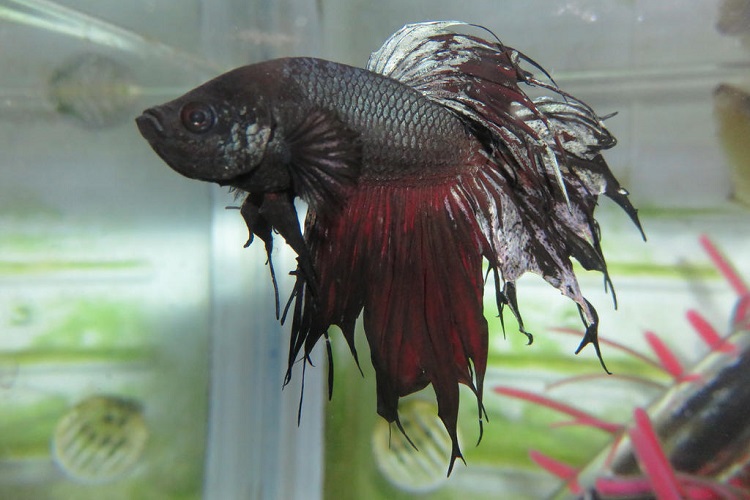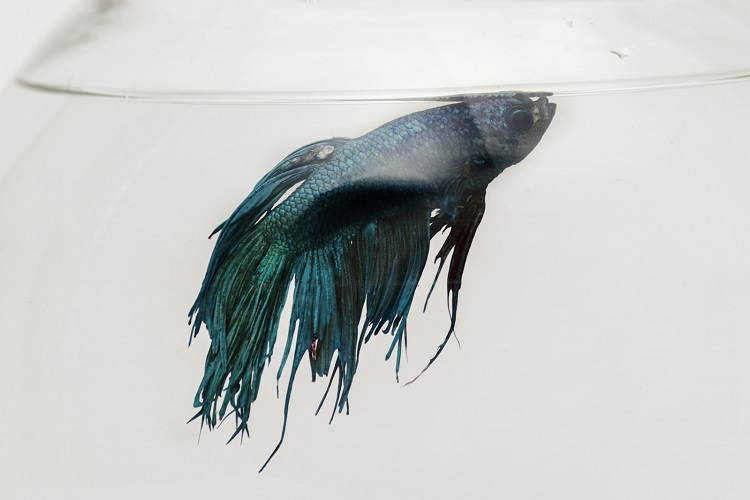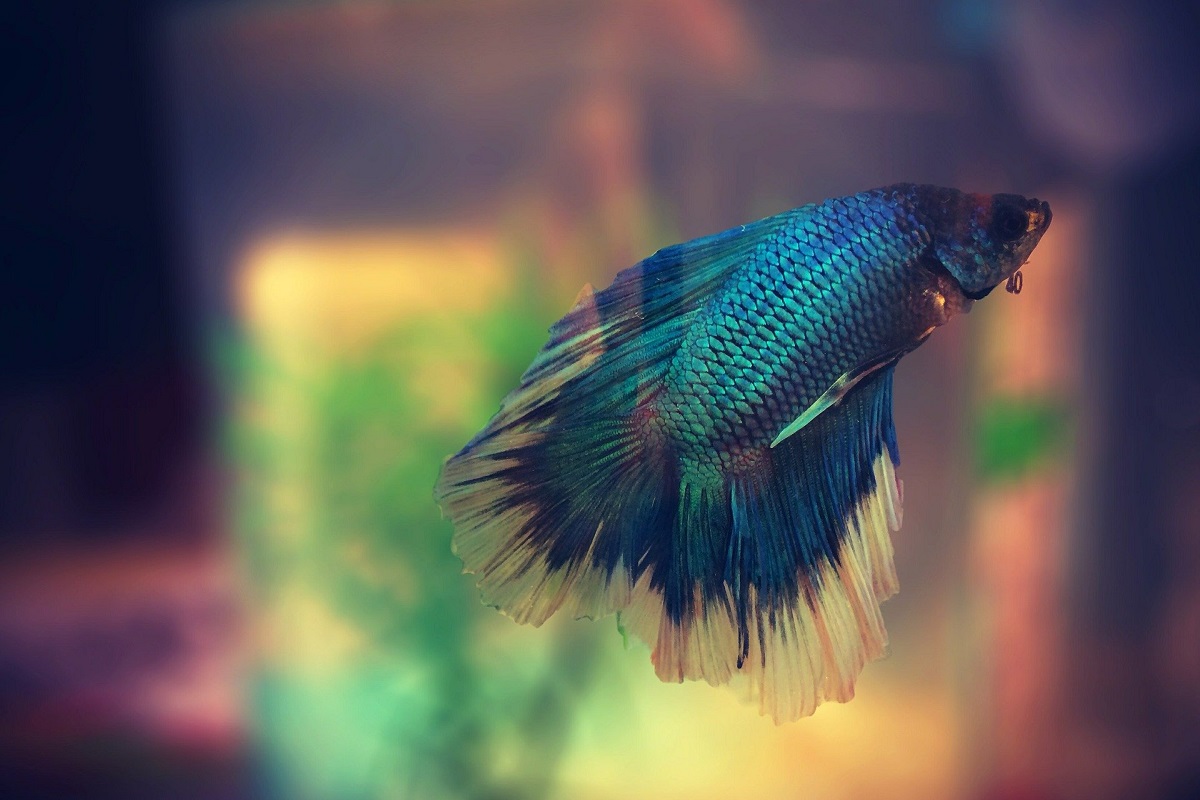Betta fish are a popular pet among many people, and you can easily find them at almost any pet store. But, they aren’t only pets. You can often find these Siamese fighting fish in the fresh waters of Africa and Southern Asia. These wild bettas are usually brown and not vibrant at all.
The betta’s vibrant, saturated colors that we know come from selective breeding. And it took around 100 years of breeding to get to our modern betta.
Their saturated colors are captivating to the eye, and their long fins flow through the water effortlessly, making it difficult not to buy one. These colorful fins are a staple for every pet betta fish, so if you start to see them deteriorating, it can be a bit concerning. If you ever notice something like this, do not take it lightly.
Your first line of action is to do some research, and you will often find two options on the internet during your search. Fin rot and fin loss. It can be challenging trying to figure out which ailment your betta is suffering from, so let’s look at the differences between the two.
Once you pinpoint the problem, you can start treating your colorful friend and getting them feeling back to normal.
Contents
What Is Fin Loss?

Fin loss doesn’t mean that your betta fish’s fins are just falling off. Fin loss is often due to a physical injury to your betta fish. And these injuries can occur from a few things.
Causes
Since fin loss is from a physical injury, you will need to start looking around your fish tank to see what could be hurting your fish. Observe your fish and see where it is swimming and where the fish commonly rests. If there are other fish in the tank with your betta, you should also pay attention to their behaviors. Let’s look at some of these injury-causing possibilities.
Nipping
Fish can get quite mean and start nipping their tank mates. Betta fish tank mates such as tetras are usually notorious for this because they are in the same family as piranhas. With this in mind, these fish won’t go insane and start eating your fish. Tetras are more prone to nipping at bettas’ fins and tails.
Other fish typically start nipping at your beautiful betta when they feel threatened or feel hungry. They may feel threatened due to an overcrowded tank, or maybe they just aren’t getting along with your betta fish.
But, it is also possible that the fish are nipping at your betta for no apparent reason. This can happen when the fish chase each other around the tank, and the fun gets a little too serious, causing them to start nipping at each other. You will need to pay close attention to all the fish in your tank to see if nipping might be the cause. Setting up a camera might be helpful.
Sharp Decorations
If your betta lives alone in its tank, then you can cross nipping off the list of causes. The next issue could be the decorations that you set up in your betta’s tank. Just because the pet store sells them, that doesn’t mean they’re always safe for your fish.
A betta’s fins and tail are extremely thin, making it easy for them to get snagged on things. One of the most common aquarium decorations that cause damage to your betta is plastic plants. Oftentimes the edges of these plants are rather sharp and could even cause minor injuries to you when adding them into the tank.
If you don’t have any fake plants in your betta’s tank, you should observe other objects that are in there. Sometimes the little fish castles have rough textures, or there may be points on them. A betta fish’s fins and tail can snag on the rough texture or get wrapped around any points on the castle.
Rough Gravel
Betta fish usually like to rest more often when compared to other fish species. If you don’t have any decorations in your tank, you will often see them relaxing on the bottom of their tank. But because of this behavior, their fins and tails can rip due to the rough gravel in your tank.
Treatment
Betta fish, like other fish, can regrow their fins and tails. So, to treat fin loss, all you need to do is remove the things that are causing the damage. Doing this will reduce stress on your fish and allow them to grow their fins and tails back.
In the case of nipping, there isn’t anything you can do to prevent this. Your best option is to separate your betta from the fish that are causing it harm. Keep the fish in separate tanks to prevent future nipping behavior.
As for your aquarium decorations, you need to take out any sharp or rough objects. You should always opt for real plants over fake plastic plants. Not only are they safer for your fish to hang out in, but they offer the following benefits to your fish tank:
- Filtration of the tank water
- Give the water extra oxygen and absorb any carbon dioxide
- Prevent algae from growing out of control
Take out other rough or sharp decorations too, such as castles, huts, and knick-knacks. If the things you have are smooth, then you can keep them.
If the gravel in your fish’s tank is rough, then you should also opt for smooth rocks so your fish can relax at the bottom of the tank without injuries.
What Is Fin Rot?

Fin rot is much different than fin loss. It happens due to a bacterial infection. This infection almost eats away at your betta’s fins and tail, causing them to fray and deteriorate. Like the name, the fish’s fins and tail are essentially rotting away. There are a few possible reasons for fin rot, and luckily they are preventable.
Causes
Seeing your betta fish’s fins deteriorating before your eyes is stressful, so you need to work fast to find out what the problem is. Here are two primary reasons for your betta fish’s fin rot.
Poor Water Conditions
Dirty aquarium water is the most common problem concerning fin rot. Proper filtration is critical with any fish tank, especially a betta tank, because they are sensitive. Poor water conditions have to do with:
- Water hardness
- Water pH
- Water temperature
- Unbalanced amounts of nitrate and ammonia
If you use tap water to fill your betta’s tank, it could have too many minerals, causing the hardness level to be too high for your fish. Of course, this depends on where you live and where your water comes from. The pH and temperature of your fish tank are important to your betta fish’s health too.
The water should be in the pH range of 6.8 to 7.4 and the temperature range of 75 to 86 degrees Fahrenheit. If these levels are off, your fish will begin to act sluggish, and fin rot is possible.
Fish are constantly releasing ammonia. And if you don’t filter the tank water, ammonia can build up and make your betta very sick. Nitrate is also very harmful to your betta fish. It gets created from ammonia, becoming nitrified bacteria. High volumes of nitrates can cause suffocation and bacteria growth.
Stress
Stress from poor water conditions is prevalent in betta fish. But, stress from things such as overcrowding, handling, and problems with tank mates can cause fin rot too. When your betta fish gets stressed, their immune system isn’t working at its best. Because of this, your fish is more susceptible to bacterial infections like fin rot.
This process is very similar to humans. When humans get stressed, their immune system isn’t as strong as it should be, so they are more prone to getting sick.
Treatment
To keep your fish healthy and treat fin rot, you’ll first need to figure out what’s causing it. To do this, you should test your betta’s water. There are plenty of test kits out there to help you do this. These test kits will help you figure out if any levels are out of whack. If you find that something isn’t right in the water, then you’ll know it’s the water that’s causing the fin rot.
You should also use medication. Pet stores and websites sell medicated drops to put into your betta’s water that specifically target fin rot and other bacterial infections. If you follow the directions on the bottle, your fish should start feeling better soon.
To keep your betta healthy, you should regularly perform water changes every week and clean the tank to prevent bacteria growth.
Differences

The primary difference between fin loss and fin rot is the fact that one is physical damage while the other is bacterial damage. Luckily both are treatable, but because of the method of damage, they need different treatments.
Physical damage, or fin loss, can quickly resolve after you remove whatever is the cause of it in your fish tank, whether it’s decorations or tank mates. Bacterial damage, or fin rot, requires medication, tank cleaning, and proper water level adjustments. Fin rot requires more work to treat.
Fin rot is also much more serious than fin loss because if it goes untreated, your betta fish can, unfortunately, pass away. In addition, the infection can quickly spread and cause other health issues with your fish. So, to prevent this, always treat fin rot when you notice any signs of infection.
Conclusion
Betta fin loss and fin rot are common ailments that can happen to your beautiful pet. Although these ailments look scary, they aren’t permanent and are curable. With a little research and the correct treatment, your fish will be on its way to recovery in no time.

Ian Sterling, founder of Fishlab.com, began his aquarium journey over 30 years ago, driven by a deep fascination for fish and their diverse personalities. His website, Fishlab.com, is dedicated to making fishkeeping accessible and enjoyable, offering beginner-friendly guidance, expert insights, and a community for aquarists to connect and share experiences.


